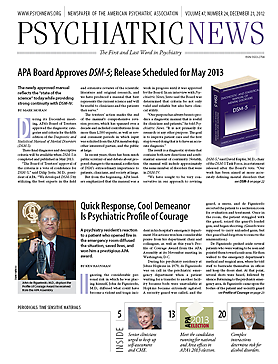Private health plans in state health insurance exchanges that will go into effect by January 1, 2014, under the Affordable Care Act must provide parity coverage of treatment for mental illness and substance abuse.
But how parity will be monitored, assessed, and enforced is not clear from a proposed rule issued by the Department of Health and Human Services (HHS) and published in the November 26 Federal Register.
The proposed rule states that private health plans in state health exchanges must offer 10 categories of health care services including mental health and substance abuse disorder services. Substitution of certain kinds of services within the 10 categories is permitted so long as the substitution is the “actuarial equivalent” to what was in the state’s “benchmark” plan. (A benchmark plan is the health plan selected by a state to be the model for its health exchange.)
The proposed rule for essential health benefits (EHB) is intended to establish standards for an “essential benefits package” that must be offered by private health plans in health insurance exchanges.
Julie Clements, J.D., M.P.P., deputy director of regulatory affairs in the APA Department of Government Relations, told Psychiatric News that the rule establishes a federal “floor” that states must meet; however, there can be considerable variation in how states configure their benefits, and state plans will likely require separate individual analysis.
In comments submitted to the Centers for Medicaid and Medicare Services (CMS) earlier this month, APA Medical Director James H. Scully Jr., M.D., praised the department’s explicit rule mandating the inclusion of mental health and substance abuse benefits at parity with medical and surgical benefits. But he noted in the comments that the rule also leaves uncertain and ambiguous how parity will be assessed—that is, what kind of rules will govern how states implement parity—and how it will be enforced.
Additionally, the proposed rule does not address scope of service and does not specify the diagnoses that have to be covered.
Regarding treatment limitations, the proposed rule states that private health plans in health exchanges must use quantitative treatment limits—that is, limits on amount, duration, and scope of covered benefits—that are “substantially equal” to those employed by the state’s benchmark plan. Scully urged that the standard also be applied to “nonquantitative treatment limits”; the latter refer to adequacy of provider networks, provider payment rates, and utilization-management techniques.
The proposed rule appears to indicate that it could be left to states to enforce nondiscrimination provisions, a potentially problematic provision, Scully said, since some states have only imperfectly enforced parity.
“Our experience with many states’ lack of enforcement of the federal [parity law]. . .illustrates why states cannot be left alone to monitor and identify discriminatory EHB design,” Scully wrote. “[W]e believe HHS must partner with states to ensure that states’ EHB, and the utilization-management techniques they employ, do not discriminate against insurance consumers on the basis of factors including their disability, age, race, and life expectancy.”
Scully also noted that the prescription drug benefit for health exchanges proposed by HHS falls far short of that provided in Medicare Part D. The proposed rule requires plans to offer the greater of either one drug per class of drug or the number of chemically distinct drugs per class in the state’s “benchmark” plan. Medicare Part D requires that plans offer “all or substantially all” drugs in the six classes of medications.
“The unique characteristics of the psychiatric patient population and psychotropic medications necessitate use of the more flexible Medicare Part D standard,” Scully wrote.
Finally, Scully strongly protested failure to determine a definition of “habilitative services,” leaving it to states to determine the scope of those services. He urged HHS to adopt a federal definition of habilitative services similar to that proposed by the National Association of Insurance Commissioners, which requires that “maintenance of function” be one of the goals of treatment.
“Many mental health and substance use disorder conditions are chronic just like diabetes or cardiovascular disease, and they require the comprehensive management approach required of other chronic conditions,” Scully wrote. “Habilitative services are essential to keep many chronically ill patients from experiencing acute episodes that may require hospitalization or other costly interventions.”■
